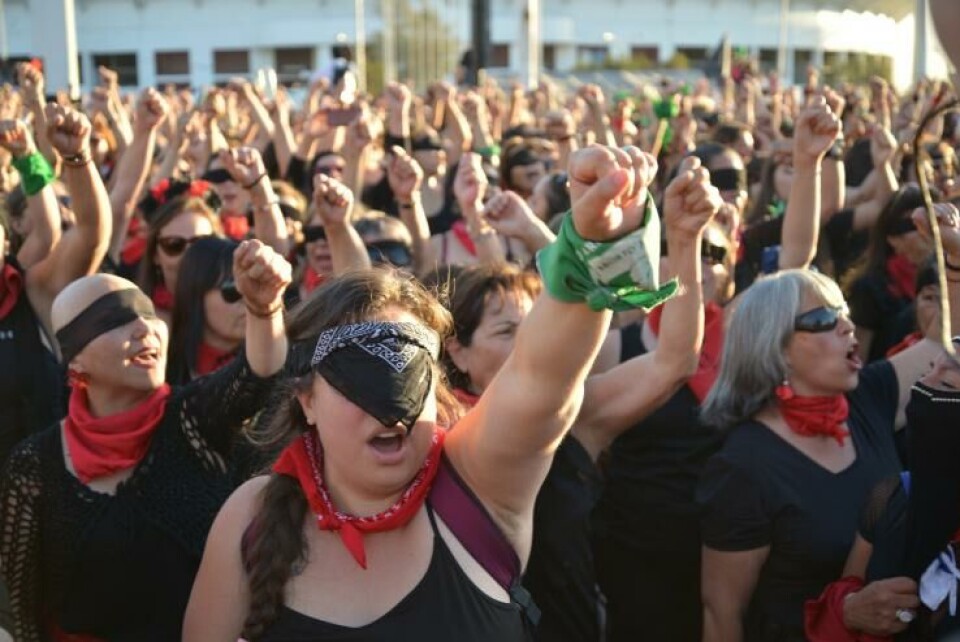article> Arts & Culture
“The oppressive state is a rapist”

The Chilean feminist group LasTesis created a performance denouncing rape culture which has inspired people all over the world.
by Maysa Mariposa
Contributing Writer
Feminists in Chile created a performance about rape culture that went viral on social media and was copied in cities throughout the world in less than a month. The performance seems to be a signal for a new start of a more radical feminism with clear demands for justice. The feminist collective LasTesis criticizes in this act the structural violence against women and the institutional negligence of this violence. They speak out against victim shaming, patriarchal violence and gender inequality.
On the 20th of November 2019 the Chilean feminist collective Las Tesis performed in Valparaíso for the first time with their rhythmic choreography and feminist lyrics on the violence against women. The performance went viral and has been reproduced in front of government buildings throughout Europe, the Middle East, Africa, South and North America. In less than ten days a video of the Chilean performances had almost three million views on Facebook and more than 247 thousand views on Instagram. On Youtube a compilation of fragments of these performances in different countries had by the end of December 2019 more than six million views with 113 thousand likes, 48 thousand dislikes, and 30 thousand comments.
The main goal of LasTesis is formatting feminist theory in a simple and catchy performance. Since not everyone has opportunities to gain further knowledge on feminist theories, they decided to adjust important feminist messages to the visual and fast lifestyle of young women today. This protest performance is about rape culture and victim shaming. It was created as a performance and not intended to become a mass street protest, which it has become. The collective based the performance of “a rapist in your way” on the theories of Rita Segato, a Chilean feminist and anthropologist who dedicated her life’s work on the violence against women.
According to Rita Segato, the action of the rapist is not a sexual action, but a moral and moralizing action. The rapist is the moral subject, the moral subject is the authority, the authority is the rapist. Rape is an expression of power, not of sexual uncontrolled lust. The political act of the rape reduces the woman to a body that can be controlled and moralized. Segato believes strongly in the upcoming strength of a new activist feminism that lives in young women today. These performances have a big impact on the women who participate in them. They form bonds and important friendships in a new global and young feminist community. They can feel stronger and strengthened by the new insights and enlarged community. They can also speak up for their rights with more confidence and knowledge.
Segato sees this sister solidarity as a new political system that will have need of a new name other than feminism.
These assemblies of women make a clear statement: rape culture should not be normalized. They speak up for gender justice and equality. The lyrics of the feminist anthem criticizes the structural patriarchal violence against women and oppressive gender inequality. They focus on rape, but refer to the wider rape culture that provides for, encourages and sustains a social and political environment of male domination and female objectification together with a moral responsibilization of the individual.
The aesthetic combination of the choreography, clothing and song lyrics create a powerful subversive community art. The performance combines an activist goal with artistic tools to both strengthen their political and social demands and enhance the creation of a feminist community. With black blindfolds over their eyes they speak out against their invisibility, the institutional negligence of the gendered violence, the victim shaming and the impunity of the rapist. The assembly of their bodies rhythmically dancing and chanting with an infectious amount of energy. It seems that the battle spirit of the first feminist wave has risen again.

The Feminist Anthem - Understanding the Words
“The patriarchy is a judge that judges us for being born and our punishment is the violence you don’t see.The patriarchy is a judge - that judges us for being bornand our punishment - is the violence that you already saw.”
The performance starts with criticizing the structural violence towards women, and the consequent negligence in light of this violence. Being born a woman in the patriarchal political system is being born as a dominated and controlled body. In these first lines of the feminist anthem it appears to be also a reference to the concept of biopower, firs described by Foucault, as a massifying controlling mechanism that “make ones live and let others di”. The structural negligence facing women, especially women of colour, is a biopolitical normalizing strategy. Foucault argued that racism was central to biopolitics, as it divides the population in two groups: those who are worthy to live and those who can be neglected. The ones who are not included in the people worthy to live, can exercise a performative right to contest their precarious conditions and question the political normalizing power that marginalizes and neglects them. This is what the Chilean women started, and many women and members of the LGBTQIA+ all over the world continued with the anthem of “the rapist is you”.
“It’s femicide. It’s Impunity for the killer. It’s disappearance. It’s rape. And the fault wasn’t mine, nor where I was, nor how I dressed”
The lyrics carry the message that being raped is not the fault of the victim, it’s the failure of the political system to safeguard against that possibility. Domestic violence, rape and murder too often go without or with too little punishment. In contrast to the unpunished rapist, the victim of the rape is often being questioned by the patriarchal system on her behaviour, her clothing and/or her body. The performers are dressed in party clothing and with a black band over their eyes. Meanwhile they are rhythmically dancing to drums. It seems like they want to evoke these moralizing judgements that are made over raped, murdered or disappeared women: “Oh, but what were they wearing?”; “Oh, but they were dancing in a very sexy way so they asked for it.”; “Oh, but walking alone at night through a dark street is irresponsible for a girl/woman.” etc. This frame of individual responsibility is seen as a moral ideal in the current neoliberalist biopolitics, whilst the same biopolitical situation makes this self-responsibility impossible because of a structural normalization of power dynamics.
“The rapist is you. It’s the cops, The judges, The state, The president. The oppressive state is a rapist.”
They further criticize the structural nature of the violence directed towards women. The violence and victim shaming is embedded in the institutions of politics, police and the court of law. Rape culture is very much part of the political system: it’s rape politics. This normalization of rape is an expression of the male-dominated neoliberal power. The ideology of male domination prescribes that the authority in both the public and the private sphere is supposed to be male. This power works through different mechanisms to create and maintain its social binary hierarchy between two genders. Foucault described power as a dominating discourse of society that forces the individual bodies to conform to normative codes. Römkens and Intervict (2010) displayed clear correlation between cultural norms that legitimate gender inequality and suppression of women. The societal gendered power inequality provides the social and political atmosphere that creates, sustains and enhances violence against women and non-men.
“Sleep calmly, innocent girl. Without worrying about the bandit,Over your dreams smiling and sweet, watches your loving cop.”
The performance ends with referring to a Chilean police anthem. In the context of their performance it attains a bitter flavour. As the feminists sarcastically chant this traditional song, one cannot help but feel the pain of this quiet cynical reference. It invokes the gender stereotyping where the feminine is innocent, sweet and vulnerable and the masculine is both the dangerous bandit and the protective cop. The good man will always protect the good woman from the bad man. This feminist performance acknowledges that the bandit and the cop are the same, and they will not sleep calmly as they know they will have to fight themselves for justice, equality and a change of system.
After listening/reading the whole lyrics of the performance, one knows that a girl is not an innocent passive subject and that she will not sleep calmly as she worries about the bandit, the cop, the judge, the politician and the male dominated discourse of society.





